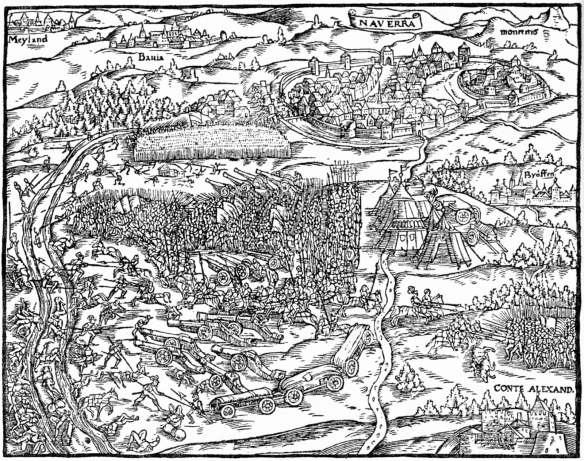Battle of Novara, (June 6, 1513). In the second decade of the Italian Wars (1494-1559), Swiss mercenaries fighting in service of the Holy League defeated a French army under Louis de la Trémoille, forcing France to abandon its effort to hold onto the Duchy of Milan. The Swiss nominally restored Duke Maximilian Sforza, but remained in effective occupation of the Duchy themselves, then milked it with oppressive taxation and the burden of upkeep of their 20,000-man army. French fortunes were reversed two years later when Francis I won a crushing victory over the Swiss at Marignano (1515), where the future reformer Huldrych Zwingli served as a chaplain in the Swiss ranks.
PRINCIPAL COMBATANTS: Holy League (Italian states, Swiss cantons, Spain, and England) vs. France
PRINCIPAL THEATER(S): Italy
MAJOR ISSUES AND OBJECTIVES: With papal support, the Holy League sought to oust the French from Italy.
OUTCOME: The French were forced out of Italy, but the Holy League did not long survive the death of the pope who had created it, and the French, now allied with the Swiss, returned to Italy after the war.
APPROXIMATE MAXIMUM NUMBER OF MEN UNDER ARMS: At the most important battle, Novara, the French fielded 10,000 men vs. an Italian-Swiss force of 13,000.
CASUALTIES: At Novara, at least 5,000 French troops and French-employed German mercenaries were killed or wounded; Holy League forces, 1,300 killed or wounded.
TREATIES: All the allies, unable to agree, made separate peace agreements with France.
When France threw its support behind Alfonso I (1486-1534) of Este against Pope Julius II (1443-1513), the pope organized a “Holy League” of Italian states, Swiss cantons, Spain, and England to field an army with the mission of pushing France out of Italy. In a vigorous campaign, the Holy League drove the French out of a number of Italian cities, including, most significantly, Milan, by the spring of 1512. Then, on June 6, 1513, a Swiss-Italian force engaged the French at Novara, 28 miles west of Milan. The French army, 10,000 men under Louis de La Trémoille (1460-1525), was surprised by an attack of the 13,000-man Swiss-Italian army, which included deadly pikemen. Although the attackers suffered heavy losses including 700 pikemen killed or wounded, they inflicted at least 5,000 casualties on the French-a stunning casualty rate of 50 percent-which caused the desertion of German mercenaries fighting in the French ranks (those who surrendered to the Swiss were summarily executed) and forced the French to withdraw from Italy entirely. Yet the French surrendered to the Swiss, and not the Holy League, which, in fact, did not prove durable.
With the death of Pope Julius II later in 1513, the league began to dissolve. The French and the Swiss would subsequently fight and then conclude an alliance that would give them control over much of Italy.
Julius II (c 1445-1513)
Pope from 1503. Born near Savona, he owed his early elevation to the cardinalate to his uncle, Sixtus IV. His own pontificate was dominated by war: he built up the papacy’s territorial power by crushing Cesare Borgia, removing the Baglioni from Perugia, and expelling Giovanni Bentivoglio from Bologna in 1506; Julius personally took charge of these campaigns. He also took on the might of the French; Louis XII, as he could not defeat him decisively with arms, tried to undermine his power by invoking the mantra of conciliarism: however, his creation, the ‘schismatic’ council of Pisa, did not receive wide support. Julius’s response was to call his own Lateran Council, which continued under Leo X.
In his uncle’s pontificate, the della Rovere cardinal was employed as military commander and diplomat. On Sixtus’s death, rumours suggested he was instrumental in securing the election of Innocent VIII; rumours also claimed that this had made della Rovere ‘more than pope’. Whatever his influence over Innocent, he had no such power in the next pontificate. Hostility between him and Rodrigo Borgia had flared up beside Innocent’s deathbed, but he could not stop Borgia’s election as Alexander VI; his reaction was to go into exile from Rome. After Alexander’s death (and the brief pontificate of Pius III), he negotiated with the other cardinals so successfully that his election was a foregone conclusion even before the conclave began.
Further reading: Christine Shaw, Julius II, The Warrior Pope (Cambridge, England: Blackwell, 1993).
